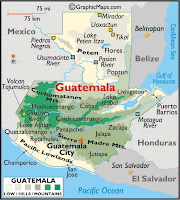Jorge Vinicio Orantes Sosa, a dual citizen of the United States and Canada was arrested on Wednesday in Calgary. Sosa is alleged to have been one of the military leaders involved in the
Dos Erres massacre in 1982 at the height of the genocide in Guatemala. During the attack, over two hundred and fifty men, women and children were massacred.
Sosa's family says that he brought them to Mexico in the mid-1980s and then on to Canada in 1988 in order to escape violence and corruption in Guatemala, where he had served in the military (
CTV.CA, has the story and a short video of his capture 1 minute in). After arriving in Canada, Sosa operated martial arts training schools in Calgary and Lethbridge and travelled the world competing. At some point in the 1990s, he relocated to the United States. After U.S. officials searched his home in Riverside County, California last spring, he fled to Mexico.
In one story, Sosa has apparently been open with his family in telling them that he was at Dos Erres when the massacre took place but he denied to them that he had participated in any way (
The Toronto Sun). In another story, however, "While Sosa's army past is not a family secret, they say Sosa sought political asylum when he arrived in the United States in the mid-1980s. He told authorities of his past, they say." (
Calgary Herald).
When Sosa left Guatemala in the mid 1980s and arrived in the U.S. with a young family, he sought political asylum, his son said.
"He told the U.S. government everything. There are no secrets. He wanted to be free and live in happiness and in the American way," he said.
"I honestly don't think he would do that (make a false statement). What's the point of lying if you've asked for political asylum?" (The Province)
Unless Sosa told authorities that he feared for his life because he did not take part in the massacre, that doesn't make sense. If he told them that he took part in the massacre but now fears for his life, that's not really strong grounds for asylum.
The United States has asked the Canadian government to extradite Sosa so that he can face charges of lying on his US citizenship application. The case is drawing similarities to that of Gilberto Jordan (see
here and
here). Jordan also participated in the attack on Dos Erres, having admitted to killing a baby by throwing it down a well. He was sentenced to ten years in prison for concealing his part in the bloodshed when he applied for US citizenship. Zero-six months in prison and then deportation is the typical sentence for lying on one's application. However, Jordan got the max because his lie was so egregious. Jordan will in all likelihood be deported to Guatemala upon completion of his sentence. Sosa's case is a bit different because he holds dual US-Canadian citizenship.
Those close to Sosa are laying the groundwork for his defense - at least in terms of where he should stand trial. They do not want him extradited to Guatemala because he will in all likelihood be executed if found guilty. It's possible, but Guatemala doesn't have a very active death penalty. President Colom vetoed legislation in November that would have reinstated the death penalty (see
here). Should UNE win the upcoming presidential elections (with Sandra Torres the most likely candidate), I don't see a change in the death penalty. Should Otto Perez Molina and the Patriotic Party win the upcoming presidential election, a change in the use of the death penalty is much more likely. However, it's difficult to see an administration headed by General Molina apply the death penalty against a former kaibil.
They also don't want him extradited to the US. At least to me, it seems a tough sell to fight Sosa's extradition to the United States to answer charges for having lied on his citizenship application based on the fear that if he is convicted and serves his sentence in the US, he will then be deported to Guatemala to face trial for war crimes. First, while thousands of soldiers, police, paramilitary, and government officials were involved in human rights abuses (including rape, torture, murder, etc.) during the conflict, there's only a dozen or so that have faced or are facing charges. Second, Sosa is a dual US-Canadian citizen. Unless Canada also revokes his citizenship, wouldn't he then be deported from the US back to Canada after having served time?
The Canadian government and courts will have to decide what to do with Sosa first. Do they try to revoke his citizenship for most likely lying on his application as well? Or do they try him for war crimes in a Canadian court?














